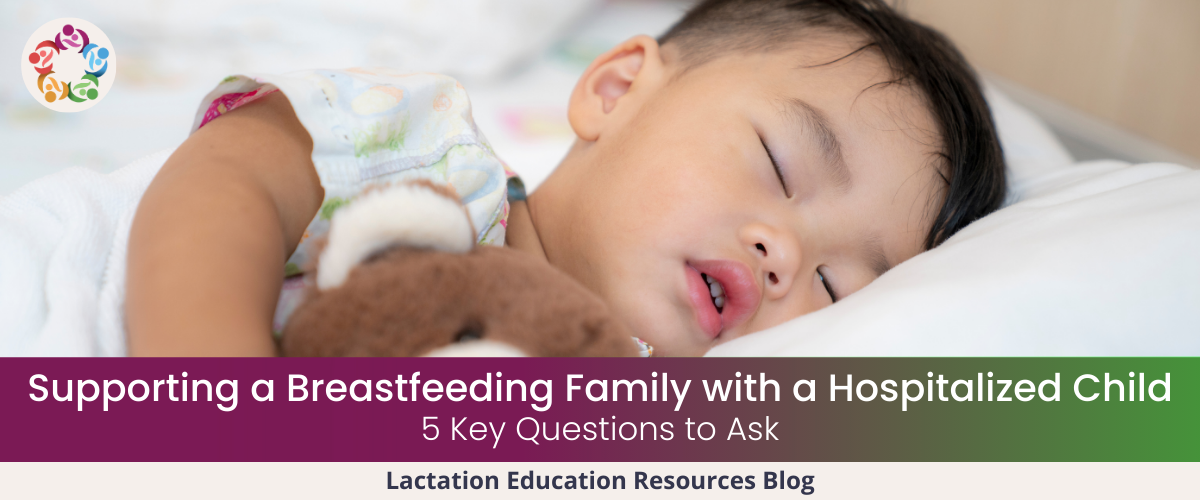How to Support a Breastfeeding Family with a Hospitalized Child


The phone rings. It's a parent whose breastfed toddler has just been admitted to hospital with pneumonia. He's on oxygen, struggling to feed, and the medical team has advised stopping breastfeeding entirely. The parent is heartbroken and confused—nursing is their toddler’s main comfort source, and they believe their milk is helping their child heal.
As a lactation professional, are you prepared to provide meaningful support? If not, you’re not alone.
Standard breastfeeding assessments and protocols are designed for healthy newborns, not sick older children facing complex medical situations. But with the right approach, you can provide crucial support during these vulnerable moments.
A Framework for Assessment
Research by pediatric nurse and IBCLC Lyndsey Hookway reveals that supporting breastfeeding families with hospitalized children requires a completely different assessment approach. Here are five essential questions that can transform how you support these families:
1. What was your child's feeding pattern before this illness?
Understanding baseline feeding helps you recognize what’s changed and what goals are realistic. A child who was exclusively breastfeeding/chestfeeding will have different needs than one who was already eating solids. This information also helps you advocate effectively with medical staff who may not understand the family’s feeding history.
Understanding baseline feeding helps you recognize what’s changed and what goals are realistic. A child who was exclusively breastfeeding/chestfeeding will have different needs than one who was already eating solids. This information also helps you advocate effectively with medical staff who may not understand the family’s feeding history.
2. Is this condition expected to be short-term or ongoing?
This fundamentally changes your support approach. An acute illness like pneumonia requires different strategies than a chronic condition like congenital heart disease. For acute conditions, focus on maintaining supply and getting through the crisis. For chronic conditions, help families develop sustainable long-term adaptations.
This fundamentally changes your support approach. An acute illness like pneumonia requires different strategies than a chronic condition like congenital heart disease. For acute conditions, focus on maintaining supply and getting through the crisis. For chronic conditions, help families develop sustainable long-term adaptations.
3. What are the specific barriers to feeding right now?
Look beyond obvious factors. Is the child too breathless? Are they in pain? Is positioning difficult due to medical equipment? Are there fluid restrictions? Each barrier requires targeted solutions. A child with respiratory distress needs frequent, shorter feeds and upright positions. A child with fluid restrictions may need expressed milk measured carefully.
Look beyond obvious factors. Is the child too breathless? Are they in pain? Is positioning difficult due to medical equipment? Are there fluid restrictions? Each barrier requires targeted solutions. A child with respiratory distress needs frequent, shorter feeds and upright positions. A child with fluid restrictions may need expressed milk measured carefully.
4. What does the medical team need to monitor, and how flexible can we be?
Sometimes medical monitoring is absolutely critical—like for a child in heart failure who cannot tolerate extra fluid. Other times, it’s routine policy that could be adapted. Can test weights replace timed feeds? Could the child feed at breast or chest and receive supplements via tube? Working with medical staff, not against them, opens possibilities.
Sometimes medical monitoring is absolutely critical—like for a child in heart failure who cannot tolerate extra fluid. Other times, it’s routine policy that could be adapted. Can test weights replace timed feeds? Could the child feed at breast or chest and receive supplements via tube? Working with medical staff, not against them, opens possibilities.
5. What are your feeding goals, and how can we protect what matters most to you?
Some families desperately want to maintain exclusive breastfeeding. Others are happy to combination feed if they can keep some direct nursing for comfort. Understanding priorities helps you focus efforts where they matter most and prepare families when goals need to shift.
Some families desperately want to maintain exclusive breastfeeding. Others are happy to combination feed if they can keep some direct nursing for comfort. Understanding priorities helps you focus efforts where they matter most and prepare families when goals need to shift.
Practical Applications
These questions lead to actionable solutions. For the respiratory-compromised toddler, you might suggest more frequent, shorter feeds in upright positions while supporting the lactating parent’s milk supply through regular pumping. For a child requiring measured intake, you could explore test weights rather than timed feeds, or supplementation at the breast/chest rather than bottles.
These questions lead to actionable solutions. For the respiratory-compromised toddler, you might suggest more frequent, shorter feeds in upright positions while supporting the lactating parent’s milk supply through regular pumping. For a child requiring measured intake, you could explore test weights rather than timed feeds, or supplementation at the breast/chest rather than bottles.
The key is moving beyond generic advice to individualized support that accounts for both medical realities and family goals.
Ready for More?
Understanding how to support lactating families when children become seriously ill requires specialized knowledge that goes far beyond standard lactation training. If you’re ready to develop the skills needed to truly support these vulnerable families, explore our comprehensive course “Filling the Gaps in Paediatric Lactation Support” and discover the practical strategies that can make the difference between a family’s breastfeeding journey ending prematurely or continuing through—and beyond—their child's recovery.
Your instructor is Lyndsey Hookway, a paediatric nurse and IBCLC with over 20 years of experience supporting families with breastfeeding. Based in the UK, Lyndsey has dedicated her career to filling the research and education gaps in pediatric lactation support. Her personal experience nursing her own child through 26 months of chemotherapy adds profound depth to her professional expertise. Lyndsey’s groundbreaking research with over 400 pediatric healthcare professionals and 30 families has revealed the extent of this crisis and pointed toward evidence-based solutions.
By accepting you will be accessing a service provided by a third-party external to https://www.lactationtraining.com/

